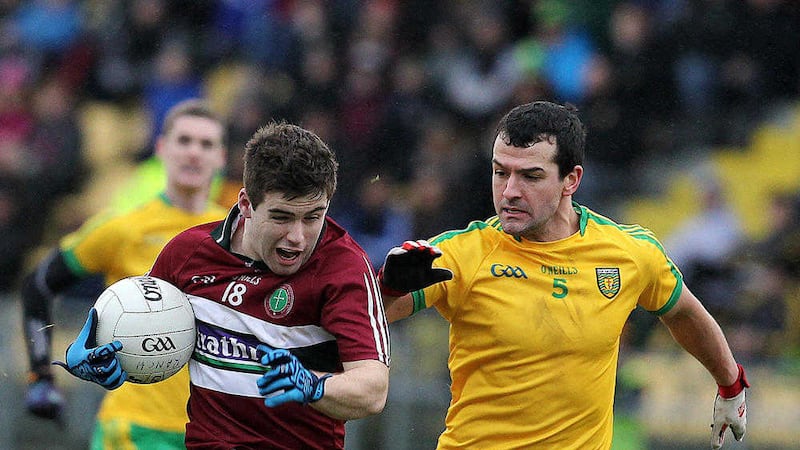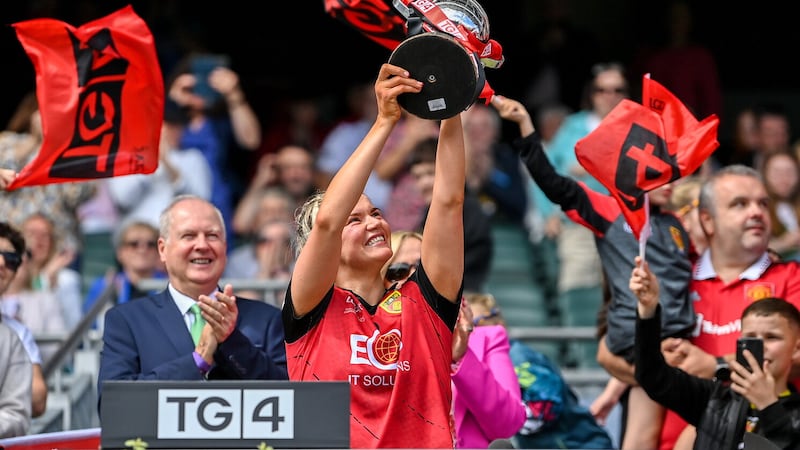IF things had gone his way at a certain time, Frank McGlynn might have been on a very different path.
In his younger days, McGlynn plied his soccer trade on a weekly basis with Drumkeen United, based on the far side of Ballybofey from his home village of Glenfin. In the spring of 2000, at the age of 14, he was picked to travel with Donegal schoolboys to a tournament in Limerick. There, as a nippy striker, he was spotted by Everton scouts and given the opportunity to join their Milk Cup squad that summer.
That squad contained a certain Wayne Rooney, just a couple of years shy at that stage of beating David Seaman and sending his own career into overdrive. A year ahead of himself, McGlynn was one of two Irish players on the Blues’ U15 squad.
Opportunity was limited though, and he was given only a play-off game at the end of the tournament to showcase his ability before heading over for a two-week trial later in the year.
“I never got asked back to Everton. Things just didn’t go my way on that trial. I was over at a few other clubs between 14 and 16-years-old,” said the 29-year-old schoolteacher at Wednesday’s launch of the Allianz National Football Leagues, held at Malone House in Belfast.
Those other clubs included his beloved Leeds. He recalls attending a Champions League clash in February 2001 with Belgian giants Anderlecht while he was on trial at Elland Road, in the season that Leeds went on to reach the last four. He was also at Wolves for a look around Molineux but, by the time it came to county minor age with Donegal with the Leaving Cert hanging over him, he had to choose.
“At that time, I was heading across the water to trials and then maybe playing for Glenfin the day after I came back. I was playing with the Donegal development squads as well," McGlynn added.
“I never stopped playing Gaelic because there was a big soccer match coming up, nor did I miss soccer games for Gaelic. There was a stage you maybe played the two in the one day, or three at a weekend. That was at underage. But in around county minor, there was too much on at the one time and, with the Leaving Cert mixed in the middle, I just decided to concentrate on the Gaelic.”
When he made the decision in the early noughties, it didn’t look as though a career in the green-and-gold would prove particularly fruitful. But at that time, there was also the pull of his club. Glenfin’s ground, Páirc Taobhoige, is at the heart of what is your average, quiet Donegal village. It’s not exactly soccer country. It was a 25-minute drive for him (or rather, his parents) to Drumkeen for soccer. That had its impact.
“I played Gaelic football with Glenfin obviously and we don’t have a soccer club in the area. You wouldn’t necessarily have been playing with your friends you grew up with," said the father-of-three.
“There was always that draw back to home, that you were going back to play with the ones you trained with from knee-high. That’s always been the way, you just liked getting back to your home club. I suppose that was a factor in going down the GAA route."
McGlynn continued to play for them in the Gaelic off-season up until the Jim McGuinness era began, since when he has stopped. That owes largely to Donegal’s success and the growing demands of Gaelic football.
Two summers out of three that ran into September contributed, but the fact there simply is no closed season is as big a factor: “You do find that the gym work and conditioning work, you’re doing it all year round now," he added.
“You don’t feel the drop as much as you would have in previous years and having to work to get back up to it. In the league, while fitness won’t win every game, if the fitness levels are high, you’ll have an advantage on some teams."
Amidst the ongoing debate about proposed reforms for the All-Ireland Senior Football Championship, McGlynn is again drawn to thinking of his club and, indeed, club players as a whole in Donegal. In 2013, to take one example, Naomh Conaill ended up playing three knockout Donegal SFC games in seven days.
With the inter-county Ulster Championship set to again span 10 weeks for just eight games in total, McGlynn feels the biggest issue facing the GAA is not the format of the Championship, but the length of time it takes to play it.
”It was very unfair to the club players, training all year to be maybe playing four Championship matches in two weeks," he said.
“They look at us and we might play four Championship matches in 12-or-13 weeks. It’s very hard to strike the balance, but there could definitely be more than one inter-provincial Championship game on a weekend, rather than one standalone fixture every weekend.”







